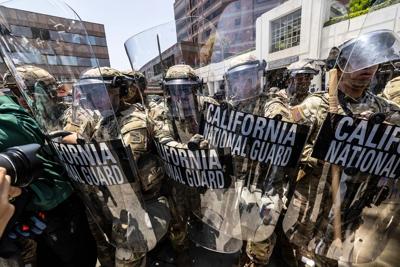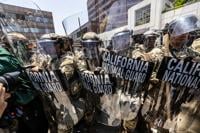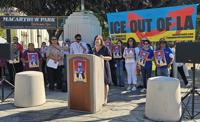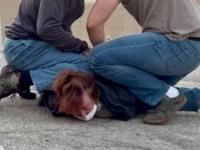
California National Guard soldiers stand with shields outside the Federal Detention Center in downtown Los Angeles, on June 8, 2025. (Photo by Ted Soqui for CalMatters)
Did the U.S. military illegally engage in civilian law enforcement when they were deployed to Los Angeles in June under the orders of President Donald Trump and Secretary of Defense Pete Hegseth?
California Gov. Gavin Newsom and Attorney General Rob Bonta say yes. Trump’s Department of Justice says no. The three-day trial to answer this question is scheduled to commence today at 10 a.m. in a California federal district court, with implications for the country as Trump continues to signal a desire to deploy troops to patrol domestic city streets.
The president has appointed himself chair of a task force on the 2028 Olympic Games in Los Angeles, telling reporters that “we’ll do anything necessary to keep the Olympics safe, including using our National Guard or military, OK?”
Relatedly, the Department of Defense issued a new activation order to deploy troops in California for another 90 days on Aug. 5, California lawyers told the court in a filing. That came two weeks after the Marines deployed to Los Angeles left and a week after the Trump administration demobilized most of the National Guard.
California’s lawyers assert evidence in their briefs, often redacted because of a court order, that the military took part in law enforcement in violation of 19th Century law called the Posse Comitatus Act. They want a judge to order the Trump administration to permanently halt those actions. The Trump Department of Justice counters that those engagements don’t count as law enforcement, but rather fall under the category of supporting immigration law enforcement agents or protecting federal buildings.
Trump has not invoked the Insurrection Act, a law that would allow the military to engage in law enforcement activity.
How did we get here?
This trial is an extension of the June lawsuit that Newsom filed against Trump after the president took over California’s National Guard. Trump did that in response to protests that broke out in the Los Angeles area after immigration law enforcement agents began workforce raids to apprehend individuals allegedly in the U.S. without proper authorization.
Ultimately, about 4,000 troops from the California National Guard and 700 U.S. Marines were deployed to Los Angeles.
That month marked a new nadir in the relations between Newsom and Trump. The governor likened the president to failed dictators. Trump endorsed the idea of arresting Newsom.
Charles Breyer, the judge in Monday’s case and oversaw the June hearings, initially sided with Newsom, ordering that Trump return the National Guard to the governor. A three-judge panel on the 9th Circuit Court of Appeals blocked that move. They found that the Trump administration legitimately called up troops to protect federal buildings and federal employees from some protesters who tossed chunks of concrete and used trash dumpsters as battering rams. California lawyers said the troops’ presence inflamed the protests.
The June protests lasted about a week and were largely isolated to a handful of city blocks in the downtown area; Los Angeles is roughly 500 square miles.
Breyer then allowed California’s lawyers to depose Trump officials and gather documents to argue California’s case that the Trump administration was violating the law barring the military from acting as a police force. Trump’s Department of Justice lawyers tried to cancel the trial but failed.
What is California’s latest allegation?
That Los Angeles residents were “subjected to a form of military occupation” as federal troops worked alongside federal immigration agents, “often indistinguishable from each other.”
The lawyers say that “never before, in the history of the Nation, has the federal government utilized the military for domestic law enforcement in this manner.”
The Trump administration’s “insistence that perimeters, blockades, and other security functions are permissible makes clear they will continue to engage in these activities,” California lawyers with the state attorney general’s office wrote to Breyer.
The lawyers argued that if military forces can accompany U.S. Immigration and Customs Enforcement agents in their raids and arrests, as had been unfolding in Los Angeles, “there would be no logical basis to preclude members of the Armed Forces from accompanying other law enforcement agents when performing their duties,” the California lawyers wrote. Military personnel could accompany federal food safety inspectors, medical fraud investigators or accompany federal voting rights officials to “monitor” election polling places, they wrote.
What are California’s examples of the military acting as police?
Attorneys representing the state pointed to several instances in which they allege troops went too far and violated the 1878 Posse Comitatus Act, which limits the use of the military in civilian settings:
- California attorneys deposed an Immigration and Customs Enforcement field director who said National Guard soldiers accompanied immigration officers on as many as 75% of their missions.
- Troops accompanied a federal agency during a “law enforcement operation” at a cannabis facility in Riverside County and formed a security perimeter that prevented people from leaving the site.
- Troops allegedly formed security perimeters on July 7 during a demonstration at MacArthur Park in Los Angeles during raids at cannabis farms in Ventura County.
- In two incidents, military service members detained civilians, the California lawyers wrote. One took place in Carpinteria in Santa Barbara County, where National Guard troops allegedly “apprehended” a protester. In the other, a Marine on June 13 allegedly detained someone at the Wilshire Federal Building in Los Angeles.
- California attorneys collected testimony from the deputy chief of staff of the military unit in Los Angeles who said the National Guard is subject to Posse Comitatus and cannot engage in civilian law enforcement.
- The attorneys point to military-issued guidance that “directly providing ‘security functions’ for civilian law enforcement agents is a violation of the Posse Comitatus Act,” per their summary. But, the lawyers note, the military unit in L.A. was ordered to “actively provide security during civil law enforcement operations on a near-continuous basis since the deployment began,” the California lawyers wrote.










(0) comments
Welcome to the discussion.
Log In
Keep it Clean. Please avoid obscene, vulgar, lewd, racist or sexually-oriented language.
PLEASE TURN OFF YOUR CAPS LOCK.
Don't Threaten. Threats of harming another person will not be tolerated.
Be Truthful. Don't knowingly lie about anyone or anything.
Be Nice. No racism, sexism or any sort of -ism that is degrading to another person.
Be Proactive. Use the 'Report' link on each comment to let us know of abusive posts.
Share with Us. We'd love to hear eyewitness accounts, the history behind an article.